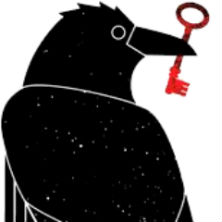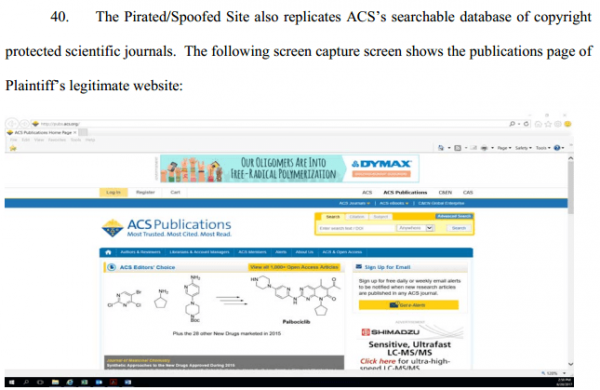QuoteShortly after Sci-Hub was ordered to pay $15 million in piracy damages to Elsevier, the American Chemical Society filed a lawsuit of its own against the "Pirate Bay for Science." The scientific society would also like to see a cut of the loot. In addition, it asks the court for a broad injunction which would require ISPs to block the site.
Founded more than 140 years ago, the American Chemical Society (ACS) is a leading source of academic publications in the field of chemistry.
The non-profit organization has around 157,000 members and researchers publish tens of thousands of articles a year in its peer-reviewed journals.
ACS derives a significant portion of its revenue from its publishing work, which is in large part behind a paywall. As such, it is not happy with websites that offer their copyrighted articles for free, such as Sci-Hub.
The deviant ‘pirate site’ believes that all scientific articles should be open to the public, as that’s in the best interest of science. While some academics are sympathetic to the goal, publishers share a different view.
Just last week Sci-Hub lost its copyright infringement case against Elsevier, and now ACS is following suit with a separate case. In a complaint filed in a Virginia District Court, the scientific society demands damages for Sci-Hub’s copyright and trademark infringements.
According to the filing, Sci-Hub has “stolen Plaintiff’s copyright-protected scientific articles and reproduced and distributed them on the Internet without permission.”
ACS points out that Sci-Hub is operating two websites that are nearly identical to the organization’s official site, located at pubs.acs.org.sci-hub.cc and acs.org.secure.sci-hub.cc. These are confusing to the public, they claim, and also an infringement of its copyrights and trademarks.
“The Pirated/Spoofed Site appears to almost completely replicate the content of Plaintiff’s website. For example, the Pirated/Spoofed Site replicates webpages on ACS’s history, purpose, news, scholarship opportunities, and budget,” the complaint (pdf) reads.
“Each of these pages on the Pirated/Spoofed Site contains ACS’s Copyrighted Works and the ACS Marks, creating the impression that the Pirated/Spoofed Site is associated with ACS.”
From the ACS complaint
![acscomplaint-e1498682376851.png]()
By offering its articles for free and mimicking the ACS website, Sci-Hub is in direct competition with the scientific society. As a result, ACS claims to lose revenue.
“Defendants are attempting to divert users and revenues away from ACS by replicating and distributing ACS’s Copyrighted Works without authorization,” the complaint reads.
With the lawsuit, ACS hopes to recoup the money it claims to have lost. It’s likely that the total damages amount will run in the millions. However, if the defendants stay out of reach, this might be hard to collect.
Perhaps this is why the current lawsuit has included a request for a broader injunction against Sci-Hub. Not only does it ask for domain name seizures, but the scientific society also wants search engines, web hosting companies and general Internet providers to block access to the site.
“That those in privity with Defendants and those with notice of the injunction, including any Internet search engines, web hosting and Internet service providers, domain name registrars, and domain name registries cease facilitating access to any or all domain names and websites through which Defendants engage in unlawful access to, use, reproduction, and distribution of the ACS Marks or ACS’s Copyrighted Works,” it reads.
If granted, it would mean that Internet providers such as Comcast would have to block users from accessing Sci-Hub. That’s a big deal since pirate site blockades are not common in the United States.
It might very well be that ACS is not expecting any compensation for the alleged copyright and trademark infringements, but that the broad injunction is their main goal. If that is the case, this case could turn out to be more crucial than it looks at first sight.

